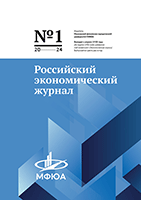Архив
Российский экономический журнал 3 / 2012
Abstracts of Main Articles
THE LAST CONVULSION OF AUTOCRATIC-SQUIRE SYSTEM (P.A. STOLYPIN TRANSFORMATIONS IN TERMS OF LENIN ESTIMATES)
Author
Frolov A.K., Social Philosopher and Political Scientist, Sovetskaya Rossiya Observer
Abstract
The author tries to demonstrate, by minutely and textologically replicating the characteristics of P.A.Stolypin political and economic transformations, expanded in V.I.Lenin works written in the wake of 1905—1907 revolution and post-revolutionary reaction, the currency of the respective evaluations as applied to the «revival» of Stolypin`s approaches in the activities of the current Russian state.
Key words
P.A. Stolypin, Stolypin land reform, third June coup, V.I. Lenin, squire landholding, farms and granted land plots, peasant community, agrarian Bonapartism, social democracy`s land programme, private land ownership, land nationalization, national leader.
CONCERNING STOLYPIN LAND REFORM AND ITS POST-SOVIET ANALOGUE
Author
Gumerov R.R., PhD (Economics), Head, AIC and Consumer Market Sector, Institute of Macro-economic Studies
Abstract
In striving to provide an «authentic» interpretation of Stolypin land reform, cleared of mythology and ideological distortions, and defining it as destructive, the author treats implementation of its «post-soviet analogue» in a similar manner too. Drawing upon his multiyear publications in Rossiisky Ekonomichesky Zhurnal, he suggests to switch from radically liberal transformations to a pragmatic policy of large-scale state support of agriculture based on modern realities.
Key words
P.A. Stolypin, S.Yu.Vitte, Stolypin land reform, farms and granted land plots, peasant community, private land ownership, grain export, national food security, market-oriented, reorganization of collective and state farms, State programme of agriculture development for 2013—2020.
CONCERNING NEW «EXTENSIVE PRIVATIZATION» AND OTHER «UNPOPULAR REFORMS»
Author
Grinberg R.S., Corresponding Member of RAS, Director, Institute of Economics, RAS
Abstract
The article puts forward arguments for counterproductiveness of not only the planned sharp reduction of the government`s stake in big companies from the major national economic industries but also the scheduled promotion of other radically liberalist, right-wing liberal reforms in economy and social sphere. Suggested as a reform alternative is a left-wing liberal policy involving a robust industry structural and strong social policy, indicative macro planning and other components.
Key words
new (second) extensive privatization, state-owned corporations, unpopular reforms, market fundamentalism, personal income flat tax rate, right-wing liberal economic policy, left-wing liberal economic policy.
BUDGETARY POLICY-2012: SAME OLD «NEST-EGG PHILOSOPHY»
Author
Delyagin M.G., Sc.D. (Economics), Head, Institute of Globalization Problems
Abstract
In direct response to the contents and results of semiannual activities of RF ministry of finance with respect to federal budget-2012 implementation, the author also addresses the much wider problems linked to continuation by Russia`s federal authorities of radically liberal socio-economic policy hindering national economic development.
Key words
2012 federal budget, domestic borrowings, foreign borrowings, undrawn balance of budget funds, reserve fund, off-shore aristocracy, liberal fundamentalism, radical liberalism.
NEW INDEPENDENT STATES: COMPARATIVE RESULTS OF SOCIO-ECONOMIC DEVELOPMENT
Author
Vardomsky L.B., Sc.D. (Economics), Professor, Head, Center for Post-Soviet Studies, Institute of Economics, RAS (General Editorship)
Abstract
The report compiles by researchers of the Center for Post-Soviet Studies, Institute of Economics, RAS, is devoted to the results of socio-economic development of all (including Baltic states)ex-republics of the Soviet Union and their mutual cooperation during the 20 years of independent existence. The first section of the report identifies the specific dynamics of the new independent states within 1991—2011. The second section suggests the countries` typology proceeding from the external development factors. The third section focuses on structural and, on the whole, modernization problems of the states under study. The fourth one deals with demographic and social problems thereof. The fifth section is devoted to evaluation ofkey economic integration projects under way in CIS region.
Key words
New Independent States, post-soviet states (countries), CIS, CIS region, Baltic states (countries), integration projects, EurAsEC, customs union of Belarus, Russia and Kazakhstan, common economic space, Eurasian Development Bank, Eurasian Union, Eurasian Economic Commission.
MODERNIZATION OF CPR`S MILITARY-INDUSTRIAL COMPLEX: ACHIEVEMENTS AND PROBLEMS
Author
Kamennov P.B., PhD (Political Sciences), Leading Researcher of Institute of Far Eastern Studies, RAS
Abstract
The article reviews conceptual and program frameworks and legal support of China`s military-industrial complex modernization, its actual progress, impressive achievements and unresolved problems.
Key words
China`s military-industrial complex, China`s State Defense Law, sixteen hieroglyphs course, China`s people`s liberation army, CPR`s Innovation Policy Law, main provisions of state medium- and long-term development plan of CPR in the area of science and technology (2006—2020).
«MinEd» CORPORATION» AS A NIGHTMARE OF LIBERAL COMMUNITY (COMMERCIALIZATION OF RUSSIAN HIGHER EDUCATIONAL INSTITUTIONS GENERATES EDUCATIONAL DISASTER)
Author
Vakhitov R.R., PhD (Philosophy), Assistance Professor at Philosophy and Sociology Department of Bashkir State University
Abstract
In substantiating his version of response to the question as to why commercialization of higher education results in degradation of its quality in post-soviet Russia, the author thereby gives reasons for a principal direction of «reforming the reform». The point is primarily of eliminating the current ugly blend of soviet and western education systems (retaining the negative and rejecting positive features thereof).
Key words
Ministry of Education of Russia, liberal reform, commercialization of higher education, paid education, education quality, education loan, GIFO (state registered financial commitment), per capita funding, university democracy, US department of education, FZ (Federal Law) No. 290 as of 6 November 2011.

